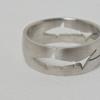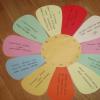Добрый друг декстер.
Привет, сегодня мы поговорим о первом разделе экзамена по английскому языку - аудирование.
Этот пост будет кое-где дублировать пост, который был о структуре экзамена.
РАЗДЕЛ «АУДИРОВАНИЕ». ВРЕМЯ ВЫПОЛНЕНИЯ – 30 МИНУТ
Итак, как вы уже поняли в разделе аудирования 3 блока задания. Это задание 1, задание 2 и задания 3-9)
Чтобы этот пост не казался очень объемным и нудным. Я дам некоторые рекомендации по выполнению первого задания по аудированию, а ниже примерный вариант самого задания.
Задание 1. В аудиозаписи звучат 6 высказываний. Нужно установить соответствие между высказываниями (буквы А-F) и утверждениями, выражающими их основную мысль (цифры 1-7). Одно из предложенных утверждений лишнее. Запись звучит дважды: вначале даётся 20 секунд, чтобы ознакомиться с утверждениями; после первого и второго прослушивания дается 15 секунд на обдумывание. Ваш ответ - это последовательность из семи цифр. За каждый правильный ответ (одно соответствие) вы получаете один балл, максимальное количество баллов – 6.
Используйте паузу перед началом задания чтобы подчеркнуть ключивые слова (как правило они в конце. Но прошу обратить внимание, чаще всего эти задания бывают одной тематики, например поход в магазин, поэтому магазин не будет ключивые словом. Вам надо понять, что отличает это предложение от других.) Это поможет вам легче ориентироваться в утверждениях и ускорить выбор ответа.
Не следует ожидать, и пытаться услышать слова в таком же порядке, в котором они даны у вас в задании. Как правило главная мысль предложения выражена другими словами и ее не копирует аудиотекст.
Это задание не требует полного понимания текста. Так что не стоит переживать если вы что-то не поняли. Попробуй сосредоточиться на главных словах текста, на ключевых словах, выражающие основную мысль говорящего.
Вы прослушайте эту запись дважды. После первого прослушивания отметьте у себя на КИМах предварительные ответы, НЕЛЬЗЯ ПЕРЕНОСИТЬ ИХ В БЛАНК ПОЧЛЕ ПЕРВОГО ПРОСЛУШИВАНИЯ даже если вы в себе уверены. Лучше прослушать запись ещё раз, чтобы не было никаких сомнений. Во время второго прослушивания сконцентрируйте свое внимание на информации, которую вы пропустили/не услышали/не поняли в первый раз или в правильности которой вы сомневаетесь.
Вам дано 7 утверждений. Из них ОДНО ЛИШНЕЕ. После второго прослушивания, убедитесь что утверждение не подходит ни к одной аудиозаписи.
Последнее и главное правило. Делайте все! Даже если вы не уверены, все равно делайте. Используйте свою языковую догадку и положитесь на интуицию.
━━━━━━━━》❈《 ━━━━━━━
Образец задания 1 в формате ЕГЭ
Вы услышите мнения 6 подростков об идеальном друге. Установите соответствие между высказываниями каждого говорящего A-F и утверждениями, данными в списке 1-7. Используйте каждое утверждение, обозначенное соответствующей цыфрой только один раз. В задании есть одно лишнее утверждение. Вы услышите запись дважды. Занисите свои ответы в таблицу.
1. A perfect friend never gossip.
2. A friend in need is a friend indeed.
3.A perfect friend is not always ideal.
4. True friends always share everything with us.
5. A true friend will never abandon you.
6. A perfect friend is always honest.
7. A true friend is the greatest of all blessings.
После этого диктор говорит "У вас есть 20 секунд чтобы ознакомиться с заданием"
Пауза (В это время, а желательно начать и раньше уже подчёркивать слова. В 9 классе я во время объяснения задания (сейчас вы будете.......) уже начинала подчеркивать и переводить предложение. Так как по мне, 20 секунд ооочень мало. Так что мой вам совет - начинайте переводить как можно раньше).
Диктор "Now we are ready to start"
И начинается запись. Все паузы включены в аудиозапись!
Ну а на этом я с вами прощаюсь, пишите в комментариях, если есть вопросы!)
Раздел 1. Аудирование
Вы услышите 6 высказываний. Установите соответствие между высказываниями каждого говорящего A–F и утверждениями, данными в списке 1–7. Используйте каждое утверждение, обозначенное соответствующей цифрой, только один раз. В задании есть одно лишнее утверждение. Вы услышите запись дважды.
1. I would not return to using chemical cleaners that are bad for my family.
2. I find recycling necessary to keep our planet clean.
3. I would like people to care more about our planet water resources.
4. I am sure our clean and safe future is worth new green habits today.
5. I am concerned about the long-term effects of pollution in big cities.
6. I am trying to stop people from polluting the air.
7. I want people stop and think about the way we treat waste.
Вы услышите диалог. Определите, какие из приведённых утверждений А1–A7 соответствуют содержанию текста (1 – True), какие не соответствуют (2 – False) и о чём в тексте не сказано, то есть на основании текста нельзя дать ни положительного, ни отрицательного ответа (3 – Not stated). Занесите номер выбранного Вами варианта ответа в таблицу. Вы услышите запись дважды.
A1 Tini can’t live a day without reading a book.
A2 Tini can’t wait to leave school.
A3 Tini has got some work experience.
A4 Tini is ready to meet the difficulties of the real world.
A5 John is pleased with his working hours.
A6 Tini disapproves of John choosing a teaching career.
A7 Tini thinks she has the right personality for a career in banking.
John: Tini, you’re a student, aren’t you?
Tini: Yeah, I am.
John: Do you like to study? Do you like your student life?
Tini: Of course. You know, I like studying although I’m not that much of a bookworm, like some of my friends who can’t imagine their lives without reading, but yes, Hike studying. I like spending time with my friends, and I just like my student life.
John: Now, soon, you’re going to graduate, correct?
Tini: Yes, fortunately or unfortunately, yes.
John: Well, why would you say fortunately?
Tini: Fortunately in the sense that, you know, it’s about time to get out into the real world and, you know, earn some money. But unfortunately in the sense that all of these precious memories, like you are putting them all behind.
John: Yeah, soon they are going to be over.
Tini: Right, and then you have more problems and responsibilities as soon as you step into the real world, which is understandable. I don’t mind this but no more spring vacation, no more summer vacation, this is tough.
John: Actually, that’s why I’m a teacher. People always ask me, why are you a teacher, John? And I say because of the time off. You get so much time off, and you don’t have to work a 9-5 schedule.
Tini: Yes, that is a very smart choice, I think.
John: Yeah, but you make no money.
Tini: Well, but you know you can be fresher and that’ll keep you young forever.
John: I don’t know about young forever but it does... you do feel energetic when you’re a teacher. I do agree. Well, you know, you can also become a teacher.
Tini: Well, actually, I’ve given it a bit of thought but right now I’m really into the banking industry.
John: Banking?
Tini: Yeah, the financial services industry, and then probably I might like to give it a go.
John: That’s going to be very stressful.
Tini: It is, but you know, I pretty much like the fast- paced lifestyle and I’m quite quick-thinking and well-organ- ised.
John: Good luck with banking then, you keep on with it.
Tini: Thank you. It’s going to be really tough, I know.
Вы услышите репортаж дважды. В заданиях А8–А14 обведите цифру 1, 2 или 3, соответствующую выбранному Вами варианту ответа. Вы услышите запись дважды.
А8 The idea of becoming a photographer
1) came to Chris after seeing big sculptures.
2) made him lose interest in sculptures.
3) was the result of his work with sculptures.
А9 Chris assisted the photographer who
1) had the latest photographic equipment.
2) used to ask Chris challenging questions.
3) gave Chris valuable professional advice.
А10 According to Chris, working as an assistant is a good way into a career because you can
1) get a better understanding of the profession.
2) make friends with a lot of talented people.
3) learn the basic techniques of taking pictures.
А11 The reason for buying a plastic camera was that it
1) was not very expensive.
2) allowed him to take original pictures.
3) was light to carry around.
А12 Chris uses the phrase “That got the ball rolling” to say that
1) he became known in photography circles.
2) his art became more dance-oriented.
3) he started to sell his first photographs.
А13 Chris goes to the dance performances because
1) he wants to find the links between them and his work.
2) it is always interesting for him to be at the premiere.
3) the choreographer recommends him to see the piece.
А14 Chris thinks that dancers are great to work with because they
1) can work long hours.
2) can cope with any problem.
3) are lively and enthusiastic.
Presenter: Our guest today is Chris Nash who is widely recognized as one of the most creative photographers in his field. He has held over 40 exhibitions of his dance photographs worldwide and has worked with world renowned dance companies and choreographers. And my first question is: What inspired you to become a photographer?
Chris Nash: A kind of it came from an odd angle I was studying fine art at college and as part of the course we spent a week in the darkroom. I found it a bit like magic, watching the pictures develop. At the time, I was making a lot of big pieces of sculpture, and because I didn’t have anywhere to store them, I would have to take photographs of them and then destroy the sculptures. This was a bit heartbreaking really, so I took real pride in the images and gradually began to develop a greater interest in photography.
P.: Did you have any formal training?
C.N.: Not really. I spent more and more time in the darkroom. The tutors were the artists making work that was photographic-based. The darkroom technician at the college was great. He was a professional photographer and introduced me to John, the photographer I assisted when I left college. I wanted to do things, and John would tell me what I would need, what equipment, what books to read. I kind ot taught myself, but he was there to help with any questions I had. The best way of learning is doing.
P.: You just said you worked as an assistant; is this a good way into a career?
C.N.: Yes, absolutely! In fact I think it is the best way. When you see an photographer working on the job, you come to realize, get a clear idea of what photography is about. You have to deal with a lot of talented people: models, performers, make-up artists etc. All of them have their particular habits and eccentricities. You need to be able to draw the best out of them and to be really patient. Ideally when you are at college you are taught all the basic techniques, but when you
come out, there is a whole lot of other important stuff to learn.
P.: What was your first camera? Or the first photo you took?
C.N.: A really cheap plastic camera. I had that when I was twelve and then I bought a single lens camera when I got to college. Then I went back to a plastic camera. I saw this exhibition where a photographer had used a really cheap camera called a Diana. It had a cheap plastic lens on it, which made everything go fuzzy and dreamy. I wanted to get the same effect, so I went to a lot of markets, to try and pick up a second-hand camera. I had two which I would carry around with me.
P.: When did you become interested in dance?
C.N.: It was while I was studying in London. At that time the Dance Centre was attached to our college. So I met a lot of dance students and saw a bit of contemporary dance. I thought this would make a great subject for photography. So, I encouraged one of the dance students to go into the studio and let me take some photographs. I was fascinated by the results and sent the pictures into a competition and I won. I won 50 pounds worth of photographic materials. That got the ball rolling. This was about 1979.
P.: Do you go to dance performances of the people you photograph?
C.N.: Yes, but not very often. The way I work is a bit back-to-front. When I take pictures, it’s usually way in advance of the actual piece being created. Working with the dancers I can only imagine what the future performance will be like. And it is interesting to find out if the work I have done corresponds to the real play. So, sometimes I will go and see the premiere. It is important for me to see if the photographs make any sense and if the piece is how it was originally described to me.
P.: What do you enjoy most about your career?
C.N.: With the exhibitions I’ve done, I’ve got to do lots of travelling. I’ve had trips abroad on shoots, which can be a great thing. Also, I have really enjoyed working with dancers and working with creative people. Dancers always have a lot of energy and are always active. When you ask them to do things, all those little directions, they have absolutely no objections. When you work with other people who don’t have that physical training, it can be difficult to work in the same way. I love going to see dance performances, but it’s different when you work with dancers. It’s right there with you and it’s really exciting. That’s what I love.
Раздел 2. Чтение
Установите соответствие между заголовками 1–8 и текстами A–G. Запишите свои ответы в таблицу. Используйте каждую цифру только один раз. В задании есть один лишний заголовок.
1. Controlling skies 5. Blocked roads
2. Lack of safety 6. Paid roads
3. Bicycle is faster 7. Improving railways
4. Office at home 8. Buses instead of cars
A. The world’s first public passenger railway was built in Great Britain in 1826 and ran between the industrial north-eastern towns of Stockton and Darlington. After 180 years’ experience the British say that their trains still don’t seem to run efficiently or even safely. On average, about 500 accidents with broken rail tracks happen in the country every year.B. The British government is promising to give £33.5 billion to modernise the railways before 2010. Another £30 billion is to come from the private sector. The main target is to increase safety and speed. For example, new London-to-Scotland high-speed trains significantly reduce journey times and in 2004 a warning system was installed throughout the country.
C. Statistics show that only 12% of all journeys made in Britain are by public transport. The remaining 88% are made by car. Every year British people spend about two weeks travelling to and from work including nine days in their own cars. But anyone will say this isn’t a quick and easy way to travel. In fact, a journey from London to Manchester frequently takes seven hours. A cyclist could get there quicker.
D. Every year there are about half a million traffic jams in Britain. That is nearly 10,000 a week. There are hundreds of big traffic jams every day. According to the forecast, the number of jams will grow by 20 per cent over the next ten years. Nearly a quarter British people find themselves in a jam every day and 55 per cent at least once a week.
E. Nowadays many British people take their children to school by car. Twenty years ago, nearly one in three primary school children made their own way to school. Now only one child in nine makes their own way. During the school year at 08:50 a. m. one car in five on the roads in any British town is taking children to school. The solution could be special school buses widely used in the USA.
F. Many scientists hope that new technologies allowing more people to work at home may help with traffic problems. Fewer people will work from 9 to 5 and travel to and from work during the rush hour. But only 15% of people now want to spend more time working at home. The workplace is, for many people, a place to meet other people and to talk to them, so they would miss it if they worked from home.
G. In 1903, the Wright brothers made the first aeroplane flight. It only lasted 12 seconds but changed the world forever. A century later, air travel is no longer a miracle, it is part of everyday life. One billion air passengers now fly every year - that’s equivalent to a sixth of the world’s population. To make sure everything runs smoothly, there are special air traffic control centres in each country which watch every aeroplane.
Прочитайте текст и заполните пропуски A–F частями предложений, обозначенными цифрами 1–7. Одна из частей в списке 1–7 - лишняя. Занесите цифры, обозначающие соответствующие части предложений, в таблицу.
Scotland YardScotland Yard is the headquarters of the Metropolitan Police in London. To most people, its name immediately brings to mind the picture of a detective - cool, efficient, ready to track down any criminal, or a helmeted police constable - A
___________________ and trusty helper of every traveller from overseas.
Scotland Yard is situated on the Thames Embankment close to the Houses of Parliament and the familiar clock tower of Big Ben, and its jurisdiction extends over 740 square miles with the exception of the ancient City of London, B
_________________.
One of the most successful developments in Scotland Yard’s crime detection and emergency service has been the “999 system”. On receipt of a call the 999 Room operator ascertains by electronic device the position of the nearest available police car, C
__________________. Almost instantly a message is also sent by teleprinter to the police station concerned so that within seconds of a call for assistance being received, a police car is on its way to the scene. An old-established section of the Metropolitan police is the Mounted Branch,
with its strength of about 200 horses stabled at strategic points. These horses are particularly suited to ceremonial occasions, D
__________________.
An interesting branch of Scotland Yard is the branch of Police Dogs, first used as an experiment in 1939. Now these dogs are an important part of the Force.
One dog, for example, can search a warehouse in ten minutes, E
_________. There is also the River Police,
or Thames Division, which deals with all crimes occurring within its river boundaries.There are two other departments of Scotland Yard – the Witness Room (known as the Rogues’ Gallery) where a photographic record of known and suspected criminals is kept, and the Museum, F
_________________.
1. which is contacted by radio
2. that familiar figure of the London scene
3. for they are accustomed to military bands
4. which possesses its own separate police force
5. which contains murder relics and forgery exhibits
6. that this policeman will bring the criminal to justice
7. whereas the same search would take six men an hour
Прочитайте рассказ и выполните задания А15 – А21, отмечая цифру 1, 2, 3 или 4, соответствующую номеру выбранного вами варианта ответа.
The Courtship of Susan BellMrs. Bell invited Aaron Houston, a famous British artist, to paint her younger daughter’s portrait. Aaron wanted to make a few drawings before he started a portrait. On the Thursday evening the drawing was finished. Not a word had been said because the girls were shy to speak in Aaron’s presence and he had gone on working in silence. “There,” said he, “I don’t think that it will be any better if I go on for another hour. I hope you will like it. There, Miss Susan”, and he sent it across the table with his fingers.
Susan’s face got red, she was embarrassed. She took the drawing and said, “Oh, it’s beautiful”. The superb originality of the drawing captivated her. A young girl was represented sitting at a table in a room filled with fresh air and the soft light of a summer day. The greenery of an old overgrown garden could be seen through the window. In front of her on the white tablecloth there was her book. The eyes of the girl looked out at you, dark grey, mysterious, sad, languorous, yet strangely intent. What was the girl thinking about? Who was the girl thinking about? The drawing was more than a portrait. It fact, the artist tackled a far bigger job than that of reproducing a definite person in portraiture and in performing which he imparted another and bigger content.
Susan’s face revealed her feelings. She turned to her mother and said, “Isn’t it beautifully done, mother?” and then her elder sister and her mother got up to look at it, and both admitted that it was beautifully done but Susan felt there was doubt in her mother’s voice.
“We thank you very much,” said Susan after a long pause.
“Oh, it’s nothing”, said he, not quite liking the word “we”.
On the following day he returned from his work to Saratoga about noon. He had never done this before, and therefore no one expected that he would be seen in the house before the evening. On this occasion, however, he went straight there, and by chance both the widow and her elder daughter were out. Susan was there alone in charge of the house.
He walked in and opened the sitting-room door. There she sat, with her knitting and a book forgotten on the table behind her, and Aaron’s drawing, on her lap. She was looking at it closely as he entered.
“Oh, Mr. Dunn,” she said, getting up and holding the picture behind her dress.
“Miss Susan, I have come here to tell your mother that I must start for New York this afternoon and be there for six weeks, or perhaps, longer.”
“Mother is out,” she said. “I am sorry.”
“Is she?” said Aaron.
“And Hetta too. Dear me! And you will want dinner. I’ll go and see about it.”
Aaron began to swear that he could not possibly eat any dinner.
“But you must have something, Mr. Dunn“ she said.
“Miss Susan,” said he, “I’ve been here nearly two months.”
“Yes, sir,” Susan said, hardly knowing what she was saying.
“I’m going away now, and it seems to be such a long time before I’ll come back.” And then he paused, looking into her eyes, to see what he could read there. She leant against the table; but her eyes were turned to the ground, and he could hardly see them.
“Will you help me?” he said. She was keeping silent. “Miss Susan,” he continued, “I am not very good at saying things like this, but will you marry me? I love you dearly with all my heart. I never saw anyone so beautiful, so nice, so good.” And then he stopped. He didn’t ask for any love in return. He simply declared his feelings, leaning against the door. Susan remained silent. Aaron ran out of the room. A15 The girls kept silent because they
1)didn’t like to speak to Aaron.
2)didn’t know what to say to Aaron.
3)were afraid to speak in their mother’s presence.
4)were too modest to speak in the guest’s presence.A16 It was a remarkable drawing as it managed to reflect
1)some hidden philosophical idea.
2)The light of a summer day.
3)The peculiarity of the environment.
4)all the nuances of the girl’s features
A17 When Susan’s mother saw the drawing, she
1)remained indifferent.
2)showed her disapproval.
3)she wasn’t sure how to react.
4)shared her daughter’s admiration.A18 The phrase “not quite liking the word “we” means that the painter
1)wanted Susan’s sister to admire his work.
2)wanted the mother to thank him personally.
3)expected all the present ladies to say something.
4)was mainly concerned about the girl’s approval.A19 What was unusual about Aaron’s visit on the following day? He came
1)later than usual.
2)earlier than usual.
3)straight from Saragota.
4)without prior arrangement.
A20 Susan was alone at home
1)by pure chance.
2)because Aaron had arranged it.
3)regularly at this time of the day.
4)because she expected Aaron to come
A21 When Aaron asked Susan to marry him he
1)was sure that she loved him.
2)just wanted to open his heart to her.
3)wanted to make sure that she loved him.
4)expected her to go with him to New York
Раздел пока пуст
Подготовка к ОГЭ и ЕГЭ
Среднее общее образование
Линия УМК М. В. Вербицкой. Английский язык "Forward" (10-11) (баз.)
Линия УМК О. В. Афанасьевой, И. В. Михеевой, К. М. Барановой. "Rainbow English" (10-11) (баз.)
Английский язык
Разбираем ЕГЭ по английскому языку: раздел «Аудирование»
Готовимся к ЕГЭ по английскому языку вместе с педагогами. Разбираем задания, ищем решения, объясняем ответы.Джалолова Светлана Анатольевна , учитель английского языка Высшей квалификационной категории. Победитель конкурсного отбора на соискание Гранта Москвы в сфере образования 2010г. Старший эксперт ГИА ЕГЭ по английскому языку. Победитель Всероссийской Олимпиады учителей английского языка «Профи-край» 2015 год. Почетная грамота Министерства образования РФ 2014 г., Грамота победителя конкурса лучших учителей РФ 2007г., Диплом победителя конкурса на соискание Гранта Москвы 2010 г.. Стаж работы - 23 года.
Недашковская Наталья Михайловна
, Учитель английского языка Высшей квалификационной категории. Победитель ПНПО 2007 г. Победитель конкурсного отбора на соискание Гранта Москвы в сфере образования 2010г. Эксперт ГИА ОГЭ по английскому языку. Проводила педагогическую экспертизу учебных изданий при РАО 2015-2016. Почетная грамота Министерства образования РФ 2013 г., Грамота победителя конкурса лучших учителей РФ 2007г., Диплом победителя конкурса на соискание Гранта Москвы 2010 г. Стаж работы - 35 лет.
Подвигина Марина Михайловна
, Учитель английского языка Высшей квалификационной категории. Победитель ПНПО 2008 г. Победитель конкурсного отбора на соискание Гранта Москвы в сфере образования 2010г. Старший эксперт ГИА ЕГЭ по английскому языку. Проводила педагогическую экспертизу учебных изданий при РАО 2015-2016. Почетная грамота Министерства образования РФ 2015 г., Грамота победителя конкурса лучших учителей РФ 2008г., Диплом победителя конкурса на соискание Гранта Москвы 2010 г. Стаж работы - 23 года.
Трофимова Елена Анатольевна
, Учитель английского языка Высшей квалификационной категории. Старший эксперт ГИА ЕГЭ по английскому языку. Почетная грамота Министерства образования РФ 2013 г. Стаж работы - 15 лет.
Задание 2А – 2G
Задание 2. Вы услышите диалог. Определите, какие из приведенных утверждений А–G соответствуют содержанию текста (1 - True), какие не соответствуют (2 - False) и о чем в тексте не сказано, то есть на основании текста нельзя дать ни положительного, ни отрицательного ответа (3 - Not stated). Занесите номер выбранного Вами варианта ответа в таблицу. Вы услышите запись дважды. У Вас есть 20 секунд, чтобы ознакомиться с заданием.
Для успешного выполнения данного задания следует помнить следующее:
- Необходимо извлекать запрашиваемую информацию из реплик каждого говорящего
- Важно понимать разницу между вариантом «Неверно» и вариантом «В тексте не сказано». Неверное предложение содержит информацию, которая противоречит аудиотексту, а вариант «В тексте не сказано» означает, что в аудиотексте ничего не говорится по этому поводу.
Прежде, чем приступать к выполнению данного задания, необходимо внимательно прочитать утверждения и попробовать представить, о чем будет говориться в аудиотексте. В данном задании нельзя предположить правильный ответ до прослушивания. До прослушивания можно представить, какая информация может потребоваться (дата, время, цифры и т.д.), чтобы решить для себя во время прослушивания какое утверждение верное, какое - нет, о каком высказывании ничего не говорится в аудиотексте.
Рассмотрим аудиотекст диалога и утверждения к нему:
1. Joan and Steve begin with settling the date of the party
2. Joan and Steve were satisfied with the last year"s party
3. Steve is not sure how to spell the name of the new Indian restaurant
4. Steve visited the Park View Hotel before
5. Joan will call the restaurants
6. Joan and Steve agree on the price of £12 a head
7. The boss of Joan and Steve is a vegetarian.
Joan:
Steve:
Joan:
First - dates… well. That’s straightforward.
Steve:
The last working day before Christmas… which is…
Joan:
… which is December 21 st .
Steve:
Joan:
Steve:
The Red Lion, wasn’t it?
Joan:
Yeah. We ought to go for something more expensive, ‘cause you… Steve: … you get what you pay for.
Joan:
Steve:
How do you spell that?
Joan:
R-A-J-D-O-O-T.
Steve:
But it’s bound to be packed.
Joan:
Steve:
Joan:
And the London Arms just in case.
Steve:
London Arms…
Joan:
Steve:
No. I’ll do it, Joan. You are really busy. Have you got the numbers? Joan: Not for the Rajdoot, but … right… Park View Hotel: 777193 and … London Arms: 207658.
Steve:
Joan:
Up to £15 a head?
Steve:
Joan:
Steve:
OK. We’ll say £12?
Joan:
OK.
Steve:
Joan:
Steve:
1. Joan and Steve begin with settling the date of the party.
Joan:
Right, Steve…About our party! Let’s try and get it sorted out today so we don’t have it hanging over us. OK?
Steve:
Good idea, Joan. I’ll take notes.
Joan:
First - dates… well. That’s straightforward
Ответ - 1 . Джоан и Стив начинают диалог с того, что собираются определиться с датами своего праздника.
2. Joan and Steve were satisfied with the last year"s party.
Steve:
…which is going to be pretty difficult to book at Christmas so we’d better think of two or three places just to be on the safe side.
Joan:
Well, last year was a disaster.
Steve:
The Red Lion, wasn’t it?
Joan:
Yeah. We ought to go for something more expensive, ‘cause you…
Steve:
… you get what you pay for.
Ответ - 2 . Стив и Джоан отнюдь не были удовлетворены вечеринкой (were satisfied), оба собеседника считают, что поздний заказ ресторана, невозможность выбора ресторана в канун праздника было катастрофой (was a disaster) для вечеринки в прошлом году.
3. Steve is not sure how to spell the name of the new Indian restaurant.
Joan:
That new Indian restaurant in Wetherfield is supposed to be excellent… the Rajdoot.
Steve:
How do you spell that?
Joan:
R-A-J-D-O-O-T.
Ответ - 1 . Стив просит произнести название ресторана по буквам.
4. Steve visited the Park View Hotel before.
Joan:
Well, let’s put that down as the first choice and have some back-ups. What about the Park View Hotel as the second choice?
Steve:
Yes, that’s always reliable. Park View Hotel…
Joan:
And the London Arms just in case.
Ответ - 3 . Стив в диалоге всего лишь говорит, что the Park View Hotel (ресторан) - надежен. Никаких указаний на то, что Стив там был ранее нет.
5. Joan will call the restaurants.
Joan:
I’ll call them now if you want.
Steve:
No. I’ll do it, Joan. You are really busy. Have you got the numbers?
Ответ - 2 , так как Джоан вызывается обзвонить рестораны, но Стив против и собирается сделать это сам.
6. Joan and Steve agree on the price of £12 a head.
Steve:
Great. Before I ring, we’d better just make sure they are within the price range.
Joan:
Up to £15 a head?
Steve:
I think you’ll find some people won’t be able to go that high.
Joan:
Well, you can’t get anything decent under £10.
Steve:
OK. We’ll say £12?
Joan:
OK.
Ответ - 1. Джоан и Стив согласны на сумму 12 долларов с человека.
7. The boss of Joan and Steve is a vegetarian.
Steve:
And we’d better make sure there’s good vegetarian food.
Joan:
Yes, you know what the boss is like.
Steve:
Don’t remind me. I’ll let you know as soon as I find out anything.
Ответ - 1. Стив и Джоан стремятся убедиться в наличии хорошего вегетарианского меню для начальника.
Задания 3-9 Множественный выбор. Вы услышите интервью. В заданиях 3–9 запишите в поле ответа цифру 1, 2 или 3, соответствующую выбранному Вами варианту ответа. Вы услышите запись дважды
Прежде чем выполнять данное задание, необходимо внимательно прочитать вопросы в задании, найти в них ключевые слова и подчеркнуть их, постараться подобрать синонимы к ключевым словам. Обращайте внимание не столько на слова, сколько на контекст. Большое значение в этом задании имеет контекст, так как и правильные, и неправильные варианты могут содержать слова и выражения из аудиотекста. В этом задании, как и в предыдущем, необходимо следить за репликами каждого участника диалога, так как запрашиваемая информация может быть в репликах любого участника интервью.
Рассмотрим аудиотекст интервью и утверждения к нему:
Presenter:
Dr Strait:
Presenter:
You mean we have to put ourselves into the role of the manager or supervisor?
Dr Strait:
Yes. And then we are going to imagine how different applicants would fit into the team or group they have to work with. So, we’ll look at some examples later.
Presenter:
It’s just theoretical at the moment…
Dr Strait:
Presenter:
Dr Strait:
Presenter:
Dr Strait:
Presenter:
But it doesn’t tell you anything. It doesn’t tell you if they are easygoing or hate smokers or whatever.
Dr Strait:
Well, arguably it does give you information about an applicant’s character, but also … more and more employers around the world are making use of what is called ‘a personality questionnaire’ to help them select new staff and…
Presenter:
Sorry, what’s it called?
Dr Straight:
Presenter:
Which makes you think that there (fade out)
1) Which of the following is emphasised in the introduction?
1. Interviews
2. Staff selection
3. Question techniques
Presenter:
Tonight we continue talking with Dr Strait. So far we’ve looked at various aspects of staff selection and I think by now you should all be beginning to see how much more there is to it than just putting the applicants through a short interview or asking the ‘right’ questions. So I think you should be ready for today’s talk on ‘matching the person to the job’.
Dr Strait:
We’re going to talk today about the importance of choosing that all- round ‘right’ person.
Ответ: 2 - Staff selection
2) Dr Strait plans to discuss …
- the value of team work.
- basic managerial skills.
- how an applicant would fit in a team.
Dr Strait:
Yes. And then we are going to imagine how different applicants would fit into the team or group they have to work with. So, we’ll look at some examples later
Dr Strait:
Yes. The point is you can select someone – even a friend – who has all the right qualifications… degrees… certificates, whatever. You can also check that they have a lot of experience… that they’ve done the sort of tasks that you want them to do in your office already, in a similar environment.
Ответ: 3 - how an applicant would fit in a team.
3) Dr Strait underlines the importance of an applicant’s…
- qualifications.
- experience.
- group work skills.
Dr Strait: Yes. The point is you can select someone – even a friend – who has all the right qualifications… degrees… certificates, whatever. You can also check that they have a lot of experience… that they’ve done the sort of tasks that you want them to do in your office already, in a similar environment. But if they start work and you realize that they just don’t get along with everybody else, that… say they’ve got sharply contrasting views on how something will work… well, with the best intentions you may be backing a loser.
|
Dr Strait underlines the importance of an applicant’s / Доктор Стрейт подчеркивает, что соискателю важны |
|
|
3.group work skills. |
they start work and they just don’t get along with everybody else, that… say they’ve got sharply contrasting views on how something will work… well, with the best intentions you may be backing a loser. |
|
1.qualifications, |
упоминаются в тексте, но судя по контексту всего отрывка, по значимости образование и опыт уступают умению работать в команде (см начало отрывка) |
Ответ: 3 - group work skills.
4) According to Dr Strait, an important part of teamwork is having trust in your…
- colleague’s ability.
- employer"s directions.
- company training.
Presenter:
Wouldn’t it be just a question of company training though?
Dr Strait:
Not always. Particularly in a team situation and I think it’s important to think in terms of that type of working environment. People have to have faith in each other’s ability to carry out the task their boss has set them. They have to trust that everyone will do their part of the job, and you can’t necessarily train people for this.
Ответ: 1 - colleague’s ability
5) The presenter doubts the effectiveness of…
- company training.
- job interviews.
- question techniques.
Presenter: But it’s like trying to find out what someone’s personality is like in a job interview... I mean you can’t just do that. Even if you try, you won’t find out what they are really like until they actually start work.
|
The presenter doubts the effectiveness of / Журналист сомневается в эффективности собеседований (2. job interviews). Им произносится следующая фраза: …it’s like trying to find out what someone’s personality is like in a job interview... I mean you can’t just do that |
|
|
1. company training 3. question techniques |
А следующие фразы: «you can’t necessarily train people for this», « in most interviews you usually ask candidates questions about their hobbies and what they like doing in their spare time… that sort of thing…», которые можно посчитать за синонимичные выражения данных вопросов, звучат в аудиозаписи совсем в других контекстах и ВНИМАНИЕ! принадлежат не журналисту, а доктору Стрейт. 1) Dr Strait: They have to trust that everyone will do their part of the job, and you can’t necessarily train people for this. 2) Dr Strait: Well, in most interviews you usually ask candidates questions about their hobbies and what they like doing in their spare time… that sort of thing… so employers are already involved in the practice of… well, doing part of the task. |
Ответ: 2 - job interviews.
6) Dr Strait claims that finding out personal information is…
- a skill that requires practice.
- avoided by most interviewers.
- already a part of job interviews.
Dr Strait:
Well, in most interviews you usually ask candidates questions about their hobbies and what they like doing in their spare time… that sort of thing… so employers are already involved in the practice of… well, doing part of the task.
Presenter
:
But it doesn’t tell you anything. It doesn’t tell you if they are easygoing or hate smokers or whatever
Dr Strait:
Well, arguably it does give you information about an applicant’s character,
Ответ: 3
- already a part of job interviews.
7) According to Dr Strait, Personality Questionnaires…
- have a very long history.
- were first used by the military.
- were invented by large employers.
Dr Straight: A Personality Questionnaire. They have to be filled out by the candidates sometime during the selection procedure, often just before an interview. The idea is actually quite old. Apparently they were used by the ancient Chinese for picking out clerks and civil servants, and then later they were used by the military to put people in appropriate areas of work. They’ve gained a lot of ground since then and there are about 80,000 different tests available now and almost two thirds of the large employers use them.
Ответ: 1 - have a very long history.
По окончании выполнения зданий необходимо перенести ответы в бланк ответов.
1
Вы услышите четыре коротких диалога, обозначенных A, B, C и D. Определите, где происходит каждый из диалогов. Используйте каждое место действия из списка 1-5 только один раз. В задании есть одно лишнее место действия. Вы услышите запись дважды. У вас есть 20 секунд, чтобы ознакомиться с заданием.
1. In a restaurant
3. In a shoe store
4. In a food store
2
Вы услышите пять высказываний. Установите соответствие между высказываниями каждого говорящего А-E и утверждениями, данными в списке 1-6. Используйте каждое утверждение из списка 1-6 только один раз. В задании есть одно лишнее утверждение. Вы услышите запись дважды. У вас есть 30 секунд, чтоб ознакомиться с заданием.
Нажмите , чтобы прослушать запись
1. The speaker can appreciate actors’ professional skills in this kind of movies.
2. The speaker usually chooses movies that are educational.
3. The speaker thinks cinema actors used to be more professional.
4. The speaker thinks this kind of movie has a positive effect on her/his relative.
5. The speaker thinks the positive side of this kind of movie isn’t always obvious.
6. The speaker thinks the story may not be very strong in this kind of movie.
Вы услышите телефонный разговор отца и дочери. В заданиях 3-8 в поле ответа запишите одну цифру, которая соответствует номеру правильного.
Нажмите , чтобы прослушать запись
3
The girl"s feelings about her roommate from South Korea are:
4
At college the two girls plan to
1. study foreign languages.
2. take music classes.
3. sing for pleasure in the college chorus.
5
What does the girl say about her classes?
1. They are too easy.
2. They are too difficult.
3. They are manageable.
6
What’s the bad news?
1. She ran out of money.
2. She is homesick.
3. She lacks friends.
8
Her father was disappointed because she spent too much money on
3. entertainment.
Раздел 2. Чтение
9
Прочитайте тексты и установите соответствие между текстами и их заголовками: к каждому тексту, обозначенному буквами А–G, подберите соответствующий заголовок, обозначенный цифрами 1–8. Используйте каждую цифру только один раз. В задании есть один лишний заголовок.
2. In a railway museum
3. Airplane alternative
4. Long and special
5. Goods delivery
6. User and nature friendly
7. From steam to electricity
A. The invention of the steam locomotive made a breakthrough in the development of the railway system in the 19th century. Today the technology seems ordinary, but two hundred years ago it was revolutionary. Steam locomotives were fueled by burning coal, wood or oil, to produce steam in a boiler, which drove the engine. Of course, large amounts of water were also needed. In the 20th century, steam engines were gradually replaced with trains fueled by diesel or electricity.
B. Some long-distance passenger trains have become famous. For example, the Trans-Siberian Railway in Russia is the longest railway in the world, covering 9,259 kilometers and 10 time zones. In the United States, the California Zephyr travels between Chicago and San Francisco, and during the 3-day trip, passengers can enjoy amazing views of the Rocky Mountains. The Orient Express between Venice and Istanbul offers old-fashioned service that is luxurious, romantic, and expensive.
C. Of course, not all trains carry passengers. Many trains are freight trains, transporting goods from one location to another. The busiest freight system in the world is in China. Freight trains are usually much longer than passenger trains. The longest freight train recorded was in Australia with over 682 cars. Freight trains can carry anything - coal, cars, clothing - anything that people need. Refrigeration, which keeps food cold and fresh, revolutionized freight transportation.
D. In many countries, overnight trains are a good option to air travel. For example, you might leave one city at 11:00 at night, and arrive at your destination at 7:00 the next morning. Typically, you share a cabin with three other people, who you might be travelling with, or who you might not know at all. Your seats become your beds and the price of your ticket includes your bedding. If you want, you can order tea and a snack from the cabin attendant.
E. Authors have been using trains in literature for as long as trains have been running. Indeed, it’s hard to imagine some stories without a train in them. Even people who have never read Anna Karenina know how the famous novel’s heroine dies at the end. Many American children learn the important lessons of optimism and hard-work reading the classic story The Little Engine that Could. And of course almost everyone on the planet knows about Hogwarts Express in the Harry Potter books.
F. Many countries around the world are investing in high-speed trains. Today’s high-speed railways are amazing. They can go twice as fast as regular trains, and they are designed for passenger comfort with spacious chairs, internet access, and multi-media entertainment. High speed rail makes it possible to move many more people much faster over longer distances. High speed rail also can help the environment because it is more energy efficient and reduces cars on the roads.
G. In the 19th century, railroad travel became the fastest way to travel long distances overland. It was a great improvement over travelling by horse and wagon, which could take weeks longer than the train. But early trains weren’t comfortable. Seats were hard and the soot from the coal engine made the air very dirty. In addition, the cars were cold in winter and hot in summer because there was no heat or air conditioning. But fortunately, since those early years, train travel has become much more pleasant.
Прочитайте текст. Определите, какие из приведённых утверждений 10–17 соответствуют содержанию текста (1 – True), какие не соответствуют (2 – False) и о чём в тексте не сказано, то есть на основании текста нельзя дать ни положительного, ни отрицательного ответа (3 – Not stated). В поле ответа запишите одну цифру, которая соответствует номеру правильного ответа.
The United Nations sponsors many wonderful programs to help people all over the world, and one of the most famous - and oldest - is UNICEF. The acronym UNICEF is short for the United Nations International Children’s Emergency Fund. The program was founded in 1946 to provide emergency food and healthcare for millions of children in the countries that had been ruined by World War II. Today UNICEF helps children in developing countries with programs that support human rights, food, healthcare, and education. UNICEF programs emphasize the importance of developing strong communities. In recognition of its work, UNICEF was awarded the Nobel Peace Prize in 1965.
UNICEF operates with a budget of over $2.7 billion. The funds are provided by governments of the member nations of the U.N. and also by private groups and individuals. In the United States and Canada, UNICEF is especially well known for its “Trick-or-Treat” program, which began in 1950. Every Halloween, in October, children dress up in magical, fantastic and scary outfits and go door to door in their neighborhoods, asking for candy. Many children also carry with them bright orange “Trick-or-Treat” boxes, and they receive money as well as candy. They get to eat the candy, of course, but the money is given to UNICEF. Over $200 million has been raised in this way - all by children dressed up as witches and ogres and fairy princesses.
UNICEF has offices and centers in over 190 countries, with thousands of staff, interns and volunteers. UNICEF also relies on famous people to help raise awareness for its projects. One of the most famous and popular was the actress Audrey Hepburn. Hepburn had herself been the child of war, having survived World War II in the Netherlands. She credited the United Nations with saving her from starvation at the end of the war. Hepburn believed her work with UNICEF was more important and more meaningful than her career as an actress.
10
UNICEF was one of the first funds sponsored by the United Nations.
11
The main aim of UNICEF programme has been to feed starving children.
12
The efforts of UNICEF as a peacemaker were highly estimated.
13
The main part of the UNICEF budget comes from the governments.
14
UNICEF uses “Trick-or-Treat” program only in the US and Canada.
15
Over $200 million come from children’s pocket money to the UNICEF budget.
16
World famous celebtrities help to promote UNICEF projects.
17
Audrey Hepburn didn’t care much for her career as an actress.
Раздел 3. Грамматика и лексика
Прочитайте приведённый ниже текст. Преобразуйте слова, напечатанные заглавными буквами в конце строк, обозначенных номерами 18–26, так, чтобы они грамматически соответствовали содержанию текста. Заполните пропуски полученными словами. Каждый пропуск соответствует отдельному заданию 18–26.
18
NOT HAVE Our family was quite small, just my Mom, Dad and me. I _____ any brothers or sisters. When I was ten years old, my parents finally decided I could have a dog.
19
DREAM I _____ of having a dog for years, but my parents used to say
20
NOT BE “No, you ______ responsible enough to take care of a dog yet.”
21
I Finally they decided I was ready! So one day, my mother drove ______ to the pound.
24
THEY But one of _____ was sitting in a corner, nervously ______ around.
25
KNOW Our eyes met! And I _____ that was the dog for me!
26
NOT FORGET I ______ that day, the day when I got my first dog ever.
Прочитайте приведённый ниже текст. Преобразуйте слова, напечатанные заглавными буквами в конце строк, обозначенных номерами 27–32, так, чтобы они грамматически и лексически соответствовали содержанию текста. Заполните пропуски полученными словами. Каждый пропуск соответствует отдельному заданию 27–32.
27
FOG It happened in 1707. On a _____ October night four English navy ships hit rocks in the Atlantic Ocean and sank.
28
TRAGEDY The ships had been sailing in the thick fog for twelve days when the _____ accident occurred.
29
NAVIGATE The compass went out of order and the commanders and their ______ were lost in the ocean.
30
LOCATE They had no way of knowing their ______ .
31
FRANCE They thought they were near the ______ coast.
32
KNOW They were wrong, and their lack of ______ cost thousands of lives.
Раздел 4. Письмо
Для ответа на задание 33 используйте отдельный лист. При выполнении задания 33 особое внимание обратите на то, что Ваши ответы будут оцениваться только по записям, сделанным на отдельном чистом листе. Никакие записи черновика не будут учитываться экспертом. Обратите внимание также на необходимость соблюдения указанного объёма письма. Письма недостаточного объёма, а также часть текста письма, превышающая требуемый объём, не оцениваются.
You have 30 minutes to do this task. You have received a letter from your English-speaking pen friend, Susan.
...Yesterday I cooked pizza myself! Yummy! What do you think of pizza and fast food in general? What do you usually have for lunch? What can you cook yourself, if you need to?
Write her a letter and answer her 3 questions.
Write 100-120 words. Remember the rules of letter writing.
Раздел 5. Говорение
You are going to read the text aloud. You have 1.5 minutes to read the text silently, and then be ready to read it aloud. Remember that you will not have more than 2 minutes for reading aloud.
The platypus is one of the most unusual creatures in the animal kingdom. Platypuses have a paddle-shaped tail like a beaver, a furry body like an otter, and webbed feet like a duck. In fact, the first time a platypus was brought from Australia to Britain, people could not believe that it was a real animal.
Platypuses make their homes in the freshwater areas. While they are in the water a lot, they will also waddle onto the riverbanks to dig burrows with their claws. These burrows are tunnels that have rooms or chambers. Platypuses also live under rock ledges, roots, or debris.
Platypuses weather many climate extremes. Their waterproof, thick fur keeps them warm in chilly temperatures, and their big tails store extra fat for energy. Platypuses usually sleep during the day and hunt at night. They hunt for their food in the water where they live.
Показать ответ
Речь воспринимается легко: необоснованные паузы отсутствуют; фразовое ударение и интонационные контуры, произношение слов практически без нарушений нормы; допускается не более пяти фонетических ошибок, в том числе одна-две ошибки, искажающие смысл.
You are going to take part in a telephone survey. You have to answer six questions. Give full answers to the questions. Remember that you have 40 seconds to answer each question.
Нажмите , чтобы прослушать запись
Показать ответ
Electronic assistant: Hello! This is the electronic assistant of the cafe The Best Choice. We are doing a market research, and we would like to offer you new opportunities for special occasions. We kindly ask you to take part in our survey. Please answer six questions. The survey is anonymous, so you don’t have to give your name. Let’s get started.
Electronic assistant: Is there a cafe in your neighbourhood?
Student: (pause 40 seconds) Well, there is one good cafe in a stone throw from my home. It is small buit extremely cute. This cafe is made in French style and it has panoramic windows and fresh flowers everywhere. _
Electronic assistant: Where do you prefer to celebrate your birthday, at home or in a cafe? Explain why?
Student: (pause 40 seconds) If I were to choose where to celebrate my birthday, I would defenetly go for cafe. The reason is that I don"t want to be bothered with cooking and washing dishes after all. Besides, I won"t missan opportunity to take cool photos in a luxuriously designed cafe.
Electronic assistant: If you had a chance to arrange a birthday party in a cafe, what kind of food and drinks would you order?
Student: (pause 40 seconds) First of all, as I have a sweettooth, a birthday cake is of utmost importance. Then there"d definely be some cocktails and champagne. Finally, I am sure if I were to organise the birthday party there won"t be staple food like vegetables and potatoes. It seems to be old fashioned for me.
Electronic assistant: What kind of entertainment would you like to have at your birthday party to make it more exciting?
Student: (pause 40 seconds) First of all, there will be a cotton candy counter, an incredible magic show and a fashionable photo booth. Then I can"t do without music and so I will invite a jazz band.
Electronic assistant: Whom would you like to invite to your birthday party, your family or your friends? Explain why.
Student: (pause 40 seconds) Surely I will invite both my friends and family, because I would like to share the happiest moment in my life with all of them. However, with no doubts there would be 2 different parties because the interesta and as a result the entertainment must be different.
Electronic assistant: What other special occasions (like your graduation party or getting a driver’s licence) would you like to celebrate in a cafe?
Student: (pause 40 seconds) To my mind, getting a Bachelor"s Degree or retirement are occasions that must be celebrated in restaurants and cafes, because they"re the most important milestones of our life and we should do our best to remember this moments forever.
Electronic assistant: This is the end of the survey. Thank you very much for your time.
You are going to give a talk about your free time. You will have to start in 1.5 minutes and will speak for not more than 2 minutes.
Remember to say:
What teenagers enjoy doing in their free time, why
What your favourite pastime is, why
Whether you help your family with household chores if you have free time, why
You have to talk continuously.
Показать ответ
I would like to start with the idea that most of the people have enough free time to relax. But the majority of them always complain that they need more and more. I think that you just have to be responsible for a wise usage of your free time. Speaking about me, I’m usually busy doing homework. But I still have enough free time to play with my friends. I would say that I have enough free time to do everything that I’ve planned. I do believe that all other teens prefer to watch a new movie in the cinema and have fun with their friends from school for example they enjoy hanging out in clubs. But my favourite day of the week is Sunday because I always help my parents with household chores such as washing dishes and taking the garbage away. The main reason why I do it is (not mentioning that it’s my responsibility to help my elderly parents) that after fullfiling my duty I go to the pool , meet with my friends and we watch a movie together. In summary, I should say that having a lot of free time is great.
Делитесь своими результатами или спрашивайте, как решить конкретное задание. Будьте вежливы, ребята.
1
Вы услышите четыре коротких диалога, обозначенных A, B, C и D. Определите, где происходит каждый из диалогов. Используйте каждое место действия из списка 1-5 только один раз. В задании есть одно лишнее место действия. Вы услышите запись дважды. У вас есть 20 секунд, чтобы ознакомиться с заданием.
1. At the teacher’s office
2. At the library
3. In a bookstore
4. At the theatre
5. In a concert hall
2
Вы услышите пять высказываний. Установите соответствие между высказываниями каждого говорящего А-E и утверждениями, данными в списке 1-6. Используйте каждое утверждение из списка 1-6 только один раз. В задании есть одно лишнее утверждение. Вы услышите запись дважды. У вас есть 30 секунд, чтоб ознакомиться с заданием.
Нажмите , чтобы прослушать запись
1. It ’s an unusual but enjoyable camp experience.
2. It’s an exciting summer experience for a city child.
3. I spend summer working in my family’s business.
4. I had an exciting experience in country studies.
5. It was a summer vacation without any new experiences.
6. I had an enjoyable fresh-air family vacation.
Вы услышите интервью с доктором Джоунс. В заданиях 3-8 в поле ответа запишите одну цифру, которая соответствует номеру правильного.
Нажмите , чтобы прослушать запись
3
The topic of this programme is
1. having a healthy life style.
2. following a healthy diet.
3. treating diet related diseases.
4
According to the interviewer, he
1. sticks to a healthy diet.
2. is ready to switch to a healthy diet.
3. is not ready to do without junk food.
5
Which is NOT a healthy diet tip given by Dr. Jones?
1. Substitute olive oil for butter.
2. Reduce the amount of food you eat.
3. Start with counting calories.
6
For eating out Dr. Jones suggests that customers should
1. share one dish between them.
2. take home some of their meal to eat later.
3. avoid all kinds of starters.
7
The Dr. Jones’s general recommendation is
1. eat more often, but smaller portions.
2. have no more than three regular meals.
3. eat only food that your body wants at the moment.
8
Dr. Jones believes that having a meal with others is beneficial because
1. your friends will help you to stick to your diet.
2. people who eat alone normally eat more.
3. conversation at the table helps you to digest food better.
Раздел 2. Чтение
9
Прочитайте тексты и установите соответствие между текстами и их заголовками: к каждому тексту, обозначенному буквами А–G, подберите соответствующий заголовок, обозначенный цифрами 1–8. Используйте каждую цифру только один раз. В задании есть один лишний заголовок.
1. Modern mission
2. Noted more than once
3. History of the symbols
4. No way to help
6. All sorts of help
7. United strength
8. Sources of financial support
A. Logically enough, the emblem of the Red Cross is a red cross on a white background. This image was first used in 1863, and it is basically a reversal of the Swiss flag, which is a white cross on a red background. Beginning in the 1870s, the Ottoman Empire started using the Red Crescent as the name and emblem for its branch of the Red Cross, reflecting its Islamic beliefs. Today, the Red Crescent is recognized by 33 Islamic nations.
B. All monies used by the International Committee of the Red Cross are received as donations from governments, public institutions, and private individuals. The organization’s annual budget exceeds 1 billion Swiss Francs. The majority of funding comes from Switzerland and the United States, with significant contributions also coming from European countries and the EU. Private donations are often received at times of local, national and international emergencies, such as the tsunami disaster in southeastern Asia in 2004.
C. Today the Red Cross has approximately 97 million volunteers, members and staff, working worldwide. The many organizations associated with the Red Cross are legally independent of each other, but they often work together to provide help to people in time of military conflict and natural disaster.
D. The idea for the International Committee of the Red Cross came to Swiss businessman Henry Dunant in 1859. He was travelling in Italy on business, when he witnessed a terrible military battle in which thousands of men died and were wounded. When he realized that the wounded men were not receiving medical care, he organized the local residents to help men on both sides of the conflict. Three years later the Red Cross was officially founded.
E. The International Committee of the Red Cross, which is based in Geneva, Switzerland, has been awarded the Nobel Peace Prize three times, in 1917, 1944 and 1963. The first two prizes were awarded for the organization’s work during the first and second world wars. The third prize was awarded on the occasion of the Red Cross’s 100th anniversary.
F. Many people around the world know the Red Cross primarily because of the help it gives people locally. For example, the Red Cross sponsors local blood drives, where people donate their blood. This blood can then be used to save the lives of people with medical emergencies. Local Red Cross offices also collect food and clothing and household goods to give to people who are forced to leave their homes after natural disasters.
G. During both World War I and World War II, the International Red Cross worked tirelessly to monitor prisoner-of-war camps, to help civilians caught in the conflicts, and to maintain lists of refugees and missing persons. Tragically, the Red Cross failed to reach an agreement with Nazi Germany regarding its concentration camps and therefore was unable to help the millions of people who died during the war.
Прочитайте текст. Определите, какие из приведённых утверждений 10–17 соответствуют содержанию текста (1 – True), какие не соответствуют (2 – False) и о чём в тексте не сказано, то есть на основании текста нельзя дать ни положительного, ни отрицательного ответа (3 – Not stated). В поле ответа запишите одну цифру, которая соответствует номеру правильного ответа.
Do you know what time it is right now? How do you know? Did you take a look at a wall clock? Glance at your wrist watch? Sneak a peek at your mobile phone? Today we take time-keeping for granted, but of course the very concept of time-keeping is a human invention, with its origins dating back thousands of years.
The first mechanism was probably the sun-dial. This method, which used the moving shadow of the sun to tell time, was widely used in ancient times. A well-constructed sundial is quite accurate, but of course it only works during the day, and only on sunny days. Hourglasses were an invention that made it possible to mark the passage of time at night, in-doors, and in the dark.
All the great ancient civilizations - Greek and Roman, Chinese, Byzantine, Islam - developed water clocks, which were very accurate. These devices were commonly used until the invention of the pendulum clock in the 17th century.
The earliest mechanical clocks didn’t have a visual indicator; they simply announced the time with striking bells. Later the 12-hour circular dial or clock face became standard. A 10-hour dial was briefly popular during the French Revolution when the metric system was applied to time keeping. And the 24 hour dial is commonly used by military organizations and transportation systems.
Today digital displays are used everywhere - on wrist watches, wall clocks, computer screens, etc. This numerical representation of time can be based on the 12-hour system (1:00 am, 1:00 pm) or the 24-hour system (01:00 or 13:00).
Like reading, telling time is something all young children have to be taught. Experts suggest that you begin this when a child is about five years old. Even though digital clocks are everywhere, it’s important to begin with traditional dial clocks, with second hands, to help the child literally see the passage of time. Giving a child his or her own wrist watch - just a cheap child’s version - can be very helpful. Teaching a child to tell time can be quite challenging, but it’s a life skill that every one of us needs.
10
New ways of time keeping are being developed today.
12
Hourglasses were developed at the same time as sun-dial.
13
Water clocks preceded pendulum clock.
14
The first mechanical clocks had no face, no numbers, no hands.
16
Digital displays are more popular today than traditional circular hour dial.
17
It’s better to use clocks with hand while teaching young children to tell time.
Раздел 3. Грамматика и лексика
Прочитайте приведённый ниже текст. Преобразуйте слова, напечатанные заглавными буквами в конце строк, обозначенных номерами 18–26, так, чтобы они грамматически соответствовали содержанию текста. Заполните пропуски полученными словами. Каждый пропуск соответствует отдельному заданию 18–26.
18
HEAT Glass is a substance made of a combination of sand, limestone, and soda, which _______ to 1500 degrees Celsius.
19
TURN As the mixture cools, it becomes very thick and eventually ______ to a solid substance.
20
HISTORY ______ believe that ancient Egyptians were the the first to invent glass.
21
FIND Recently archeologists ______ 5,000-year-old glass beads
22
BLOW In about 100 B.C., Syrian craftsmen learned how to make hollow pots or vases by______ air into molten glass through a long, narrow iron tube.
23
THEY The Romans used this technique to create beautiful artwork. They also found a way to make glass for windows in _______ houses.
24
USE Today glass ______for things such as windows, light bulbs, kitchenware, and sophisticated scientific equipment.
25
THOUSAND ______ of products, from wine to cosmetics, are packaged in glass containers.
26
IMAGINE Modern life cannot _____ without glass.
Прочитайте приведённый ниже текст. Преобразуйте слова, напечатанные заглавными буквами в конце строк, обозначенных номерами 27–32, так, чтобы они грамматически и лексически соответствовали содержанию текста. Заполните пропуски полученными словами. Каждый пропуск соответствует отдельному заданию 27–32.
28
SKILL Each of them insisted that he was more ______ than the other.
29
CONCLUDE They argued about this question for a long time without reaching any _______. Each man claimed that his handiwork was much better than the other’s.
30
FINAL ______ they agreed, “Let"s go to the king and ask him to be the judge”.
31
TRUE When they came to the king, the two begged “We want Your Majesty to be our judge and tell us whose skill is ______ superior”.
32
WEALTH We don’t know what the king said or did, but when the two returned home, they were both _______ and became best of friends.
Раздел 4. Письмо
Для ответа на задание 33 используйте отдельный лист. При выполнении задания 33 особое внимание обратите на то, что Ваши ответы будут оцениваться только по записям, сделанным на отдельном чистом листе. Никакие записи черновика не будут учитываться экспертом. Обратите внимание также на необходимость соблюдения указанного объёма письма. Письма недостаточного объёма, а также часть текста письма, превышающая требуемый объём, не оцениваются.
You have 30 minutes to do this task. You have received a letter from your English-speaking pen friend, James.
... Some of my friends don"t read books. As for me, there is nothing like a good book! Do you read summaries instead of real books, why or why not? Can you get a good grade in Literature, if you do so? What book are you reading now?...
Write her a letter and answer her 3 questions.
Write 100-120 words. Remember the rules of letter writing.
Раздел 5. Говорение
You are going to read the text aloud. You have 1.5 minutes to read the text silently, and then be ready to read it aloud. Remember that you will not have more than 2 minutes for reading aloud.
Water covers over 70% of the Earth’s surface. It is a very important resource for people and the environment. Water pollution affects drinking water, rivers, lakes, and oceans all over the world. In many developing countries, safe drinking water is still a problem. Over 1000 children die every year as a result of diseases caused by water pollution.
Electronic assistant: Hello! This is the electronic assistant of the club Money Matters. Our purpose is to improve financial competence of teenagers and young adults. We kindly ask you to take part in our survey. Please answer six questions. The survey is anonymous, so you don’t need to give your name. Let’s start.
Electronic assistant: How do you get your pocket money?
Student: (pause 40 seconds) I get my pocket money 2 times a week. And during the month I do my best to save up and not to live on shoestring at the end of the month.
Electronic assistant: What do you usually buy with your pocket money?
Student: (pause 40 seconds) First of all, I can"t do without coffee so everyday afterclasses I pop in corner coffeshop to drink several cups of coffee. Secondly, I am a shopoholic. That is why I spend almost all my pocket money on clothes in chase of obtaining pieces from the latest collection.
Electronic assistant: Where do you prefer to do the shopping, at the shopping mall or on the Internet? Why?
Student: (pause 40 seconds)Nowadays it’s becoming more and more popular to shop online. I’m firmly convinced that it’s the most comfortable way. You just surf the Internet and look through the enormous range of goods. Moreover, you can compare prices and find a real bargain. Also, you can have your purchases delivered. It’s amazingly easy and saves a lot of time and energy. Thus, if you’re not a fan of shopping like me, do it online.
Electronic assistant: Would you like to have a part-time job to earn more pocket money? Explain why.
Student: (pause 40 seconds) To tell you the truth I would like to find a job. But the thing is that I am too busy to have it. My workload is huge and overhelming mainly because I have classes until 4 pm then I do sports and after all I have to cook somethinf for the dinner for my family. All in all, I am exhausted at the end of the day even without having a job.
Electronic assistant: What would you advise a teenager who wants to buy an expensive thing but doesn’t have enough money for that?
Student: (pause 40 seconds) First of all, you should speak to your parents and try to convince them to lend you more money. If it doesn"t work, try to save up during several months.
Electronic assistant: Would you like to be rich in the future? Why?
Student: (pause 40 seconds) It might sound suprising, but I don"t want to be rich. As far as I am concerned, all rich people are evel, cruel and pushy. What"s more, I am sure the real happiness has nothing to do with richness. And relly precious things you can never ever buy for money.
Electronic assistant: This is the end of the survey. Thank you very much for your time.
You are going to give a talk about exams. You will have to start in 1.5 minutes and will speak for not more than 2 minutes.
Remember to say:
Whether exams are a good way of testing students knowledge, why/why not
What exam seems the most difficult for you, why
What advice you can give students who are getting ready for exams
You have to talk continuously.
Показать ответ
To my mind, exams are the worst way of assessment. I consider so mainly because there are so many factors that can affect your mood or health on the day of the exam. Thus, the mark that you get does not always show your real knowledge. That is why I am sure that continuous assessment I mean oral presentations, the projects, public talks that you have had is a better and more precise demonstration of knowledge. Well, it is also worth mentioning that the most difficult exam for me is English owning to the fact that I am lack a real communication with native speakers. What’s more, it is almost impossible to find a highly qualified tutor. However, there’re some tips I can share with those who are preparing for sitting the exam. First of all, relax. Make a cup of tea and buy a bar of chocolate with nuts for stimulation of brains. Secondly, it is helpful to turn on your favourite music. Finaly, you should fell in love with what you are studying and then with no doubts you will pass the exam with flying colours.
Делитесь своими результатами или спрашивайте, как решить конкретное задание. Будьте вежливы, ребята.



















